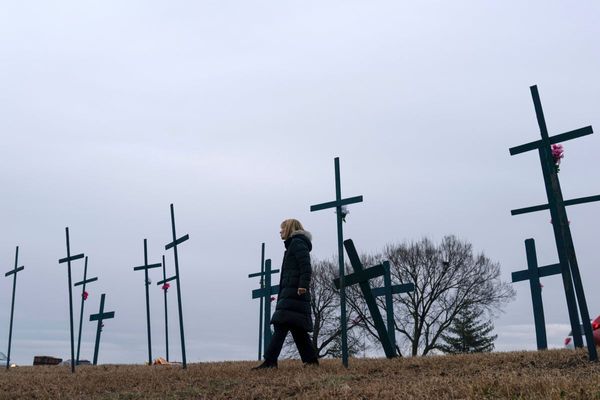
The death of John Bender mystified the world. A handsome American millionaire, Bender moved to Costa Rica with his wife, Ann, two years after they married, and set about building a 2,000-hectare nature reserve, centred on a mountaintop mansion that had neither walls nor windows. But despite moving to this vision of paradise, the couple’s mental health fell into sharp decline and in January 2010, Bender died of a gunshot wound to the head.
Thanks to an unscientific forensic investigation by the Costa Rican authorities, the perpetrator remains unknown. Suicide is one option – John had written emails about wanting to die in the weeks previously – but the fact that he was shot in the back of the head, in bed, while wearing earplugs, suggests that Ann may have shot him. In the intervening years, the Costa Rican justice system (which has no double jeopardy law) has tried Ann Bender for murder on three separate occasions; of these, she was convicted once and acquitted twice.
It is, by all accounts, a fascinating case – and it has been rigorously detailed in the new podcast series Hell in Heaven. In an effort to discover the events that led to Bender’s death, journalist Becky Milligan travelled to Costa Rica and conducted interviews with almost everyone involved.
“It was quite full on,” Milligan says of the trip, over video call with her producer Poppy Damon. “Serendipity steps in when you’re on the ground. With some of the interviews, we didn’t know them before we got there, then it just flowered. In situations like that, you have to have your wits about you.”
“We understood the story a lot more once we’d gone there,” adds Damon. “When we went into the jungle, the audio of all the different creatures and birds was so rich. It was like nothing I’d ever heard. My ears couldn’t really process the amount of sound. And going to the property just takes your breath away, because it’s this massive building with no walls, and it looks like a car park, but it’s also sort of beautiful.”
The Benders’ mansion – Boracayan to them, The Benderdome to less impressed locals – did indeed represent a bold move. Having made a fortune on Wall Street, Bender set about building his paradise home to his exact specifications. But, as a neighbour points out in the podcast, a lot of people underestimate the noise and darkness and isolation of jungle life, and as such “a lot of people go kind of crazy”.
And so it came to pass. Ann’s psychiatrist at the time came to believe that the pair were psychotic, and diagnosed Ann with folie à deux, a disorder where two people reinforce each other’s mental illness until it reaches extreme proportions. In addition, Ann was battling Lyme disease, and John – despite having no medical training – chose to shun conventional medicine in favour of injecting her with water from a local stream.
The Benders’ decision to live this way does seem somewhat eccentric. Similarly, John’s decision to try to cure Ann with injections of untreated water sounds a little like abuse. And then there’s the fact that the initial crime scene pictures were such poor quality because they were lit by more than 500 Tiffany lamps that Ann had compulsively collected.
It’s these outré details, combined with the lack of resolution, that tends to get people hooked. And they do get hooked. Carol Vaughn, an American journalist (and author of Crazy Jungle Love, a book about the case) who works in Costa Rica, has seen her fair share of grisly murders – in 2021, she covered the mass murder of an American coffee farmer and his staff, which was by all accounts unthinkably horrifying – but it was the death of Bender that plunged her into obsession.
“Obsession is the right word,” she clarifies. “It was all things Bender, 24 hours a day. Didn’t comb my hair, didn’t brush my teeth. Dog barely got walked. I thought I was writing a love story. I thought, this is Shakespearean. This is biblical, the love these two people had for each other. And so I was writing it from that point of view. Meanwhile, the whole world was viewing it as a crime story and nothing more. At the time of his death, they were both deeply depressed. That chemistry, I think, made one of their deaths inevitable.”
Set out like this, the death of John Bender sounds as if it might make the basis for yet another grubbily exploitative true crime podcast. However, the beauty of Hell in Heaven lies in the humanistic way Milligan and Damon approach the subject matter.
“Visiting Costa Rica meant that we could meet people face to face, and be really fair and interested in the characters, rather than have the voyeurism which sometimes happens with these things,” Milligan says. “One of the most moving things was speaking to John’s parents, Paul and Margie. It just brings it home that this is a family tragedy, and any of us could go through this.”
The podcast also takes a lot of care in following the aftermath of the death, not least Ann Bender’s subsequent woes. She weighed just 38kg when police arrived at the crime scene and, to quote a friend of hers, looked like “someone who had just walked out of a concentration camp.” Jewels of hers worth $16m (nearly £12m) vanished in the aftermath of John’s death. And she was tried over and over again by Costa Rican prosecutors. “First, she was acquitted,” says Vaughn. “Then, she was found guilty on all counts. The third time, she was acquitted again due to lack of evidence, but then immediately the prosecutor put in for a fourth trial.”
This is where Vaughn’s story collides with Ann’s. “I was the representative for the American embassy, and I snuck her a new emergency passport the day she was acquitted,” she says. “I was sitting right behind her. I slid it under the chair. She put it right next to her heart, and was gone two days later. I mean, she was out of here and she’ll never be back. She’s lost her money, her property, her jewels, everything. She’s wiped out.”
And yet the central mystery at the heart of the case – was it suicide or murder? – remains frustratingly out of reach. “The reason it hooks people in is because, if you pull a thread, more seem to come out,” says Damon. “There were things we just kept chasing, like a mercenary who we planned to meet, and he stood us up.”
“John is forever fascinating,” adds Milligan. “So is Ann. They tried so hard to create something beautiful, and do something good. What stays with you is how it all went wrong.”
To varying degrees, Vaughn, Milligan and Damon have been plunged into the core of a mystery that looks as if it will never be solved. With all the insight they have, do they have any suspicions of what the truth might be?
“That’s what’s tormented me because I can’t honestly say what happened that night, and I’ve read everything that can be read about it,” says Vaughn. “When I visited Ann in jail, I found a woman so not playing with a full deck of cards that I didn’t even ask her, because I don’t think she knows. I honestly don’t think even she knew what happened that night.”
“I almost always return to the key things that jump out,” says Damon. “Both of them were mentally really unwell, so it was a pressure cooker. I think it’s strange that he had a gun. It’s also very strange that he had his earplugs in. The details are strange and bizarre.”
“There are so many details where you can say, ‘Oh, this means that, and that means this,’ but no, it doesn’t,” says Milligan. “You go backwards and forwards, yo-yoing all over the place. Maybe we will never know. Let’s just tell the story and talk about the love, the tragedy and the paradise they tried to create. That is their legacy.”
Hell in Heaven is available on 9 October, wherever you get your podcasts







